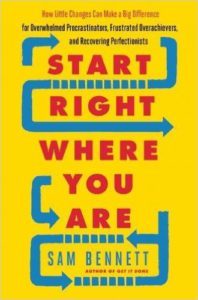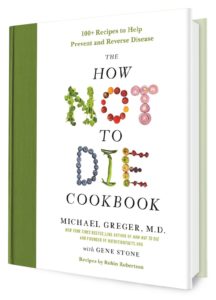
Interview by Janae Jean & Spencer Schluter
This mid-month episode we spoke with author, coach, businesswoman and actress, Sam Bennett. Ms. Bennett is the author of Start Right Where You Are and Get It Done, as well as several books. She is the founder of The Organized Artist Company, where she “helps creative people become more organized and organized people become more creative.” We spoke with her about the human creative spirit, how making small changes leads big shifts in our lives, what true perfection is, and how to stop standing in our own way and start living the lives we are here to live.
The following article only contains a snippet of our conversation, listen to the podcast below to hear much more and subscribe on iTunes, GooglePlay, Stitcher, and/or YouTube. –J.J.
Janae: You have a theme between this book, Start Right Where You Are, and your previous book, Get It Done. What in your life inspired you to get into this field?

Sam: That’s a great question. The books came out of the books that I kept buying. They are the books I kept trying to read. There’s a lot of books out there about how to get organized, how to set goals, how to manage your time, and how to be more productive, and those books are terrific. But, creative people don’t really care who’s “moved their cheese.” That’s not really how we roll.
Then there’s a lot of creativity books out there, but most of them are focused on spiritual healing through creativity or unleashing your inner-artist. For those of us who are already plenty unleashed, thanks very much, I really wanted something that spoke to us about how we move forward. When you are a creative person, you got a million different ideas. You’re pulled in a lot of different directions. You’re not always super-motivated by money. You have a lot of self-doubt and perfectionism. It can get a little complicated. So, I really wanted to talk to my brothers and sisters in the creative world and say, “Your work matters, and you can do this.”
JJ: Why do you think artists are inclined to be overachievers, perfectionists, or procrastinators? Where do you think that comes from?
SB: Well… I think it comes from a lot of different places. Partly, I think it comes from having a lot of different talents and skills. I’ve never met a single disciplinary artist. Every creative person I know is like, “Well, I’m a writer, but I also dabble around in French Cooking. I do needlework. I used to make stained glass windows, but not so much anymore. Oh, I do clog dancing on Thursdays.” We’re interested in a lot of things. We have a lot of talents and skills, and frankly, we’re used to being able to pick things up kind of quickly. We’re used to being quite adept at things, which often means we don’t develop much in the way of patience. We’re tenacious as hell, but if we can’t get something right away we’re like “I’m bored, I got to go.” That’s a little bit incomprehensible to others who may not have as many talents and skills. To them, it feels like we’re unfocused, or that we should just pick one thing. But, when you’re good a lot of things, you expect yourself to be good at a lot of things. So, I think that leads to some of the high standards. But also, we get big ideas. We get big ideas all the time! We got six big ideas before breakfast, and it’s a big idea with a sequel and a theme park, and a grass roots movement, and t-shirts. It’s the whole thing, and then we immediately get overwhelmed. How do you even move forward with an idea that that’s big? So that cycle kicks in a lot. I can see it so clearly in my mind, but I don’t even know how to start.
JJ: Absolutely.
Spencer: I’m actually kind of the opposite. I think I taught myself to do this at some point. I think I used to have a lot of perfectionism, but at a certain point, I focused on the step-by-step part… One hundred percent is perfect, but nothing ever gets to one hundred percent; it’s literally not possible. It’s not that I don’t care about quality, it’s that I want it to be “good enough.” Then I want it to be “done,” then move on to the next part of the process or the next project. I talk a lot about “pulling the trigger.” It will never be perfect, you’re not getting it out there. Nobody’s reading it until you pull the trigger on it.
SB: That’s exactly right. You’ve touched on a lot of important things there. Some of it is frankly just the spiritual maturity that it takes to say, “The work is more important than my big, fat opinion about the work.” It’s more important to me to get my work out there, where it can touch people and heal people and make people smile or cry or do whatever it does, than it is for me to satisfy some weird little button inside of myself that says “perfection matters.”
I did myself a big favor when I redefined “perfection” inside of my mind. I don’t think of “perfection” as being “without flaws.” I think of perfection like an egg is perfect, or like a baby is perfect, or like a leaf is perfect. It may have discolorations; it may be a funny shape, but it’s perfect unto itself. It is fully expressed as itself, and it is fully lovable as itself. When I did that, that helped a lot.
SS: The idea of creating something so perfect that nobody could say anything negative to you is impossible.
SB: Yes. When you think about your favorite pieces, the music, the books, the movies or the TV shows that have meant the most to you, that have “saved” you when you were crying on the living room carpet at three in the morning. It didn’t save you because it was perfect, you don’t love it because it’s perfect. You love it because it means something to you… because it spoke to you… because it explains your feelings to you in a way that you could understand… because it gave you comfort in some way. That’s really what we’re about.
The thing about criticism I think is really interesting because my background’s in theater, right? So, I’m an actor, improviser, I did a lot of theater and a lot of film and television. When people are criticizing your acting, they’re talking about you…. And we want to be loved and we want to be approved of… And so, what I started to do was take elements of criticism and just add the word “sometimes” to it. “I thought that performance was totally fake.” Totally fake, I just breathe that in, totally fake. Can I find where that’s ever been true? Have a I ever done anything that was totally fake? Probably. Sure. At least mostly fake, I have totally faked it. Was I faking it in that moment? I didn’t think so, but okay… So, I’m totally fake… sometimes. I’m totally fake sometimes. Yeah, sometimes I am, and sometimes I’m one hundred percent genuine and sincere. That’s the end of war, like Byron Katie says, that’s the end of war. You’re saying what they’re saying is true… Boom! End of argument!
Be sure to listen to the entire 60-minute interview to hear more practical advice. Subscribe to the podcast to get all of the latest episodes as they are released.
Connect with Sam via Facebook, Twitter and YouTube, as well as www.theorganizedartistcompany.com.
Don’t forget, we want to see how you are creating a “New Year, New You” this January 2018! Our “New Year, New You” PHOTO CONTEST is on now until February 10, 2018.

How has Conscious Community inspired you? Have you made one of the recipes from our HEARTh & HOME column? Have you taken that yoga class to begin a regular meditation practice after reading one of our features? Did you discover your favorite book in our In-Print column? We want to SEE how we are a part of your lives.
To enter, simply post a photo to Facebook showing something we inspired you to do, make, read, etc. and TAG us (or email [email protected] with the subject January 2018 Photo Contest.) One lucky photographer will receive the How Not To Die Cookbook co-written by January’s podcast guest, Dr. Michael Greger. Our favorite photos will be featured in print. online, and in our social media!
The How Not To Die Cookbook features delicious, plant-based recipes that are EASY-to-make that will help you eat your way to a healthier life in 2018!
We look forward to seeing how we inspire you to a NEW YEAR, NEW YOU in 2018!
Janae Jean serves as editor, social media manager and podcaster for Conscious Community Magazine. She has an M.M. in computer music composition from Johns Hopkins University and is actively researching using electronically generated sounds for healing. See janaejean.com and perennialmusicandarts.com for details about Janae’s upcoming classes, lesson information, workshops, shows and projects.
Spencer Schluter is the advertising account manager, social media manager and podcaster for Conscious Community Magazine. His experience includes visual communications, advertising, social media, marketing, public relations and business development. Visit yggstudios.com for more information about his freelance design and consulting work. He is also a master level Reiki and traditional Chinese Qigong practitioner.
Podcast Theme Music: Sublimation (Theme from the Conscious Community Podcast)
Janae Jean Almen and Spencer Schluter, composers SpindriftGreenMusic Publishing ©2017
Podcast: Play in new window | Download
Subscribe: RSS
 Conscious Community Magazine Dedicated to Elevating Consciousness
Conscious Community Magazine Dedicated to Elevating Consciousness





